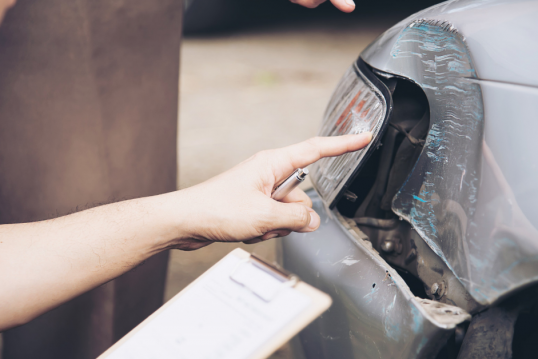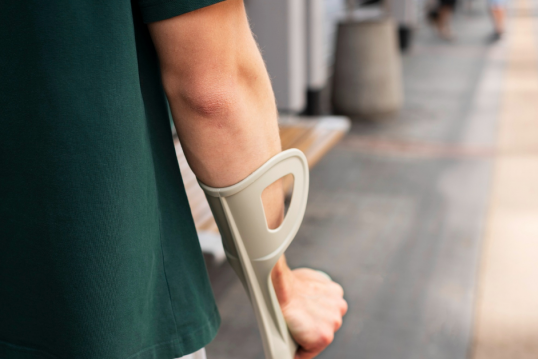Accidents on escalators, elevators, and moving walkways in resorts can result in serious injuries. While some falls are truly unavoidable, many only happen because of negligence by the property or another third party.
Las Vegas resorts and casinos have a legal responsibility to keep their guests safe. Under premises liability law, if a resort fails to inspect, repair, or warn about hazards, it can be held accountable for any injuries that result.
At the Cottle Firm, we help people who have been hurt in resort accidents fight for the financial compensation they deserve. If you’ve recently been injured on an escalator, elevator, or moving walkway due to negligence, we’re prepared to help you protect your rights, collect evidence, and start building a case against the property. Call our Las Vegas hotel and casino injury lawyers today at 702-722-6111 to discuss your case in a free consultation.
Negligence for Resort Injuries
When you’re visiting a resort or casino, the last thing you expect is to get hurt on an elevator, escalator, or moving walkway. But sadly, these accidents happen more often than you might realize, and many are preventable. Let’s take a look at how negligence works in these and other resort injury cases.
What Constitutes Negligence?
Negligence occurs when someone who owes you a duty of care fails to meet that responsibility, and that failure causes harm. In resorts, the property owner or management has a legal duty to keep all areas of the property safe for guests. This duty includes ensuring that escalators, elevators, and moving walkways are properly maintained, inspected regularly, and safe to use.
Negligence can take many forms. Here are some common forms of negligence that can result in a fall on an escalator, elevator, or moving walkway:
- A malfunctioning escalator that suddenly stops or jerks
- A loose or broken handrail
- Wet floors near moving walkways
- Elevators that stall unexpectedly due to electrical issues
- Poor lighting, unclear signage, or a lack of safety warnings
How Premises Liability Applies
Premises liability law exists to hold property owners accountable when their negligence causes injuries to visitors. This means that if the management of a resort, casino, or hotel knew or should have known about a hazard and failed to address it, they can be held liable. Premises liability covers all areas accessible to guests, including elevators, escalators, and moving walkways.
A key aspect of premises liability is proving that the resort had knowledge of the hazard or that the danger was reasonably foreseeable. For instance, if an escalator had repeated malfunctions documented in maintenance logs, the resort could be considered aware of the risk and held liable for any accidents and injuries involving that escalator.
Elevators and Escalators as Common Carriers
Elevators, escalators, and moving walkways are considered common motor carriers under Nevada law. NRS 706.036 defines a “common motor carrier” as a public-facing person or operator who transports passengers or property between different locations. Common motor carriers are held to a higher standard of care, since any lapses in maintenance or safety standards could result in major accidents with severe or even fatal injuries.
The owners and operators of elevators, escalators, and moving walkways must remain vigilant and address any potential issues as soon as they arise, before property guests get hurt. Once a repair has been completed, they must also have a state inspector evaluate the equipment to make sure it is safe for use before reopening.
If a property fails to meet this legal duty and a guest gets injured as a result, the property could be held liable in a personal injury claim.
Immediate Steps to Take After a Fall
Taking the right steps after a fall is important for protecting your health, preserving evidence, and strengthening any legal claim you may pursue. Here is what you should do immediately following a fall on a Las Vegas escalator, elevator, or moving walkway.
Seek Medical Attention
Not all injuries are obvious right away. A jolt from a moving walkway or a sudden stop on an escalator can cause sprains, back strain, or internal injuries that may not show immediate symptoms. Visit a medical professional soon after the fall to create an official record of your injuries and begin treatment before complications arise.
Notify Hotel or Casino Security
Report the incident to the resort or casino as soon as possible. Ask to speak with security and request that an official incident report be filed. Make sure to get a copy. This report creates an official record and establishes that the accident occurred while you were on the property.
Document the Scene and Preserve Evidence
If you’re able, take photos or videos of the area where the fall occurred. Capture any visible hazards, such as wet floors, broken handrails, uneven surfaces, or poor lighting. Keep any clothing, shoes, or personal items involved in the accident in their original condition, as they can be important pieces of evidence.
Collect Witness Information
If anyone saw the accident, ask for their names and contact information. Witnesses can provide statements that support your account of what happened and help confirm the circumstances of your fall. Even employees or other guests who noticed hazards before your accident can provide valuable testimony.
Request Security Footage
Resorts and casinos have extensive video surveillance covering nearly all corners of their properties. Ask security or management to preserve footage of the area where the fall occurred. Video evidence can help show exactly how the accident happened and may reveal contributing factors that aren’t immediately visible, such as equipment malfunction or crowding.
Investigating Maintenance and Inspection Records
Evidence from the scene is only part of the puzzle. It’s also important to understand how the resort cared for its equipment before your accident. Escalators, elevators, and moving walkways require routine maintenance and inspection, and lapses in this responsibility can be a major factor in a fall case.
Reviewing Maintenance Logs
Resorts are expected to keep detailed records of inspections, service calls, and repairs. These logs can reveal how frequently the equipment was checked, what problems were identified, and whether repairs were completed properly (or ignored altogether). A pattern of missed inspections or repeated breakdowns may indicate that the resort wasn’t doing enough to keep guests safe.
Third-Party Contractors
Many resorts hire outside companies to maintain their escalators, elevators, and moving walkways. While outsourcing is common, it doesn’t remove the resort’s duty of care to its guests. If contractors failed to perform adequate maintenance, both they and the resort might share liability.
Resort Knowledge of Hazards
To prove negligence, your lawyer must demonstrate that the resort knew, or should have known, about the dangerous condition that caused the accident. Prior complaints from guests, repeated mechanical problems, or ignored safety warnings all point to awareness of a hazard. If management was aware of the risk and chose not to act, that failure strengthens your case significantly.
Building a Case for an Elevator, Escalator, or Moving Walkway Injury
Collecting evidence is only part of the process. To turn that information into a strong negligence claim, you need a clear strategy. Building a case against a resort requires quick action, coordinating different types of documentation, and sometimes bringing in experts to explain how and why the accident happened.
Timing is Key
Resorts and their insurers move fast after an accident. Surveillance footage can be erased within days, and maintenance records may become harder to access over time. Acting quickly allows your legal team to send preservation letters to the resort, requiring them to hold onto evidence that could otherwise disappear. If you wait too long to act, you could lose access to key evidence and have trouble filing a personal injury claim.
Additionally, Nevada imposes a two-year statute of limitations (NRS 11.190) for personal injury claims. This means if you want to file a lawsuit, you must do so within two years of the accident. However, it’s best to act as quickly as possible.
Combining Medical and Incident Documentation
Your medical records, photographs, witness statements, the resort’s incident report, and any other evidence must all connect clearly to the fall. When these documents align, they provide a strong narrative: the hazard existed, the resort failed to address it, and you suffered harm as a result. This combination is often what convinces insurers (or a jury) that negligence occurred.
Using Expert Analysis
Sometimes, proving negligence requires specialized knowledge. Engineers, safety consultants, or accident reconstruction experts can explain why an escalator malfunctioned, whether an elevator met safety standards, or how a moving walkway was improperly maintained. These expert opinions give credibility to your claim and can counter arguments made by the resort’s defense team.
Common Challenges in Resort Injury Cases
Even when the circumstances of a fall seem straightforward, resort injury cases often become complicated. Resorts and their insurance companies are experienced at defending against claims, and they rarely admit fault without a fight. Understanding the challenges you might face can help prepare you for them and avoid common pitfalls.
Disputes Over Fault
One of the most common defenses resorts raise is to shift blame onto the guest. They may argue that you weren’t paying attention, that your footwear was unsafe, or that you failed to use the equipment properly. Strong evidence can counteract these claims and show that the resort’s negligence was the primary cause of your injuries.
Nevada evaluates fault using the modified comparative negligence standard. Both parties in a personal injury claim are evaluated and assigned a percentage of fault. You may still recover compensation even if you are deemed partially at fault, as long as the percentage is less than 51%. However, any settlement or judgment awarded to you will be reduced by your percentage of fault.
Limited Access to Key Evidence
Surveillance footage, maintenance logs, and inspection reports can be some of the strongest evidence in a negligence case. The problem is, these records are controlled by the resort. Without quick legal action to preserve them, they may be “lost” or deleted.
Resorts may also be reluctant to share internal communications or prior complaint records that could show they knew about the hazard. This is why it’s crucial to act quickly and work with an attorney who knows how to use preservation letters and subpoenas to force the resort to retain and hand over these materials.
Complications With Third-Party Liability
When outside contractors are involved in maintaining escalators, elevators, or moving walkways, liability may be shared between the resort and the service company. Sorting out who is responsible can add another layer of complexity to the case. An experienced Las Vegas resort injury lawyer can identify all parties involved and ensure that you’re not leaving any potential compensation on the table.
Resorts Fighting Hard to Avoid Liability
Las Vegas resorts are high-profile businesses with powerful legal teams. They may deny wrongdoing, downplay the severity of your injuries, or offer quick, lowball settlements in hopes you’ll accept less than your case is worth. They may even argue that escalators, elevators, and moving walkways carry inherent risks, and that your injuries were unavoidable. An experienced Las Vegas resort injury lawyer will work to overcome these tactics.
Learn More From a Las Vegas Resort Injury Lawyer
A fall on an escalator, elevator, or moving walkway inside a Las Vegas resort can change your life. These injuries often come with steep medical bills, time away from work, and lasting pain. At the Cottle Firm, we understand the difficulties you may be facing after such an injury. If you or a loved one has been injured on a resort escalator, elevator, or moving walkway, don’t wait. Contact the Cottle Firm today at 702-722-6111 to explore your legal options in a free consultation.









